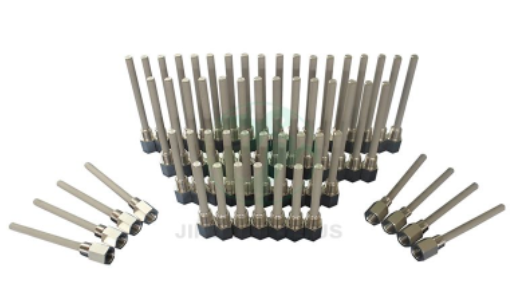Exploring Filtration with Sintered Metal Filters
Author:
CC
Feb. 27, 2024
143
0
0
Filtration is a critical process employed across various industries to separate solids from liquids or gases, ensuring product purity, quality, and safety. Sintered metal filters are a popular choice for filtration applications due to their unique properties and versatile capabilities.

1. Construction and Working Principle:
Sintered metal filters are composed of metallic particles bonded together through a process called sintering. During sintering, the metal particles are heated to high temperatures, causing them to fuse and form a porous structure with interconnected pores of controlled size and distribution. This porous structure allows fluids to pass through while retaining solid particles, contaminants, and impurities.
The working principle of sintered metal filters is based on mechanical filtration, where particles larger than the pore size of the filter are captured and retained on the surface or within the pores of the filter media. This enables the separation of solids from liquids or gases, resulting in clarified fluids or purified gases.
2. Applications:
Sintered metal filters find applications across a wide range of industries and processes, including:
Chemical Processing: Sintered metal filters are used for catalyst recovery, polymer filtration, resin filtration, and solvent filtration in chemical manufacturing processes.
Oil and Gas: In the oil and gas industry, sintered metal filters are employed for crude oil filtration, natural gas filtration, hydraulic fluid filtration, and fuel filtration to remove contaminants and ensure product purity.
Food and Beverage: Sintered metal filters are utilized for beer filtration, wine filtration, juice clarification, and food processing to remove particulates, yeast, bacteria, and other impurities.
Pharmaceuticals: In pharmaceutical manufacturing, sintered metal filters are used for sterile filtration, particulate removal, and clarification of drug formulations, ensuring product safety and compliance with regulatory standards.
Explore more:
Why ESD Antistatic LDPE Liners Are Essential for Electronics
The Advantages of Utilizing Reusable Food Storage Bags with Zip Closure
Ultra Thin Aluminum Stickers
4 Tips to Select the Right EPE Foam Packaging Tube
Top 5 Benefits of EPE Foam Packaging Tubes You Didn't Know
How Does Antimicrobial Coating Technology Work?
How Does Conductive Adhesive Tape Work?Water Treatment: Sintered metal filters play a crucial role in water treatment processes, including filtration of drinking water, wastewater treatment, and filtration in desalination plants, removing suspended solids, bacteria, and contaminants from water streams.
3. Advantages:
High Efficiency: Sintered metal filters offer excellent filtration efficiency due to their uniform pore structure and high porosity, ensuring reliable removal of contaminants and impurities.
Wide Range of Pore Sizes: Sintered metal filters are available in a variety of pore sizes, ranging from submicron to several hundred microns, allowing for precise filtration tailored to specific applications.
Chemical and Thermal Resistance: Sintered metal filters exhibit excellent chemical compatibility and thermal stability, making them suitable for use in harsh operating conditions, including high temperatures and corrosive environments.
Longevity and Durability: Sintered metal filters are durable and long-lasting, withstanding repeated use and cleaning cycles without degradation or loss of performance.
Customizable Designs: Sintered metal filters can be customized in terms of shape, size, pore size distribution, and surface properties to meet the unique requirements of different filtration applications.
Conclusion:
Filtration using sintered metal filters offers a reliable and versatile solution for separating solids from liquids or gases in various industrial processes. With their high efficiency, wide range of applications, and numerous advantages, sintered metal filters continue to be a preferred choice for filtration across industries such as chemical processing, oil and gas, food and beverage, pharmaceuticals, and water treatment. By leveraging the unique properties of sintered metal filters, industries can achieve enhanced product quality, process efficiency, and operational reliability in their filtration processes.
Explore more:10 Things You Should Consider When Choosing EPE Foam Custom InsertsHow EPE Foam Custom Inserts Solve Packaging IssuesKey Questions to Ask When Selecting Eco-Friendly Packaging SolutionsOPS Shrink Film vs. PVC Shrink Film: Which is Better?




Comments
Please Join Us to post.
0